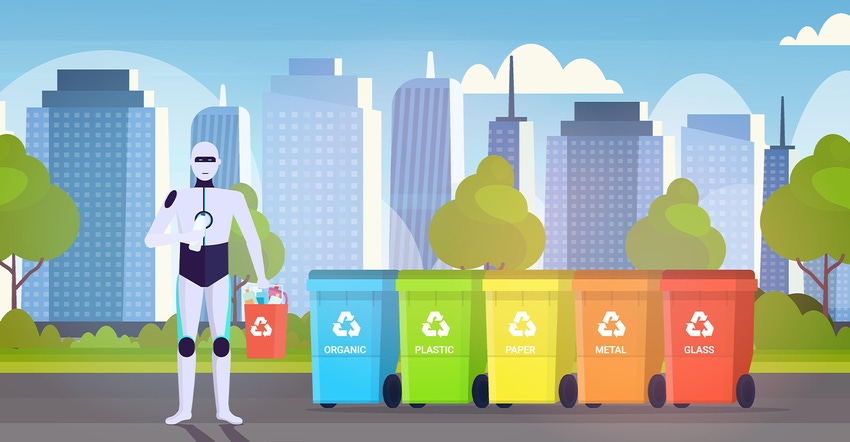AI Revolution Shaping the Waste Industry in 2024 and Beyond: Part One
As we creep into 2024, AI tools and related advancements will evolve at a staggering pace. This is as long as we don't have a Terminator situation on our hands, but I'm more optimistic than that. With the future booming right in front of our eyes, I reached out to AI professionals to get their thoughts on how AI will shape our immediate future in general and in the waste industry. Experts from AMP Robotics, Everestlabs, and Clean Robotics shared some insight.

It's no surprise that artificial intelligence (AI) has become so commonplace for many of us in our day-to-day lives and most professional settings, being such a transformative force and constantly pushing the boundaries of possibility.
As we creep into 2024, AI tools and related advancements will evolve at a staggering pace. This is as long as we don't have a Terminator situation on our hands, but I'm more optimistic than that.
With the future booming right in front of our eyes, I reached out to AI professionals to get their thoughts on how AI will shape our immediate future in general and in the waste industry. Experts from AMP Robotics, Everestlabs, and Clean Robotics shared some insight. Plus, Nicole Sroka, CEO at Mind Moves, who spoke at WasteCon 2023, shared some of her outlook for AI in the next year.
The next year, and honestly, every year moving forward, will surely be transformational for AI utilization in waste. For 2024, waste and recycling experts feel that sorting and collection will take a huge step forward thanks to AI implementation. Plus, a boost in consumer behavior and education.
"AI will give unprecedented visibility into the collection and sorting processes for MRFs and reclaimers. This visibility will help MRFs and reclaimers clean up recycling streams, automate collection and sorting processes, increase recovery, and track/audit recovery rates. This visibility will also help reclaimers trace and verify contamination levels in their feedstock, keeping their suppliers accountable. This will ensure a high yield of quality materials to be made back into recycled materials, like rPET," says JD Ambati, founder and CEO at EverestLabs.
For AMP Robotics, the company has recently implemented its AI-powered sortation technology into facilities via a fully automated, facility-scale sortation solution. Waste management customers will be able to deliver maximum resource recovery while decreasing labor and cost.
"We're incredibly excited about what we've shown is achievable when the capabilities of AI are built in at the facility level. Whether it's in safety, data, reliability, consistency, handling of exceptionally dirty material streams, cost, or environmental impact, we've been able to bring a new level of performance into the realm of the possible. We'll see AI at facility scale change the industry over the coming year and help to rapidly expand the scale and scope of the recycling industry in the years to come," added Matanya Horowitz, founder and CEO, AMP Robotics.
"We'll see AI moving beyond pilot projects and entering real-world operations, making a tangible impact on efficiency, sustainability, and even consumer behavior. I think, in particular, that waste education is ready to be overhauled by new progress in AI, and we'll be seeing some real exciting products being released," added Tanner Cook, CTO & co-founder, Clean Robotics.
As for the next five years, Cook believes AI will push existing trends to new heights. He anticipates advancements in more powerful and intelligent robots for efficient material sorting, targeted and impactful education, and enhanced data insights for better long-term decision-making.
AI will remain a major catalyst for innovation in waste and recycling in 2024, but we're still just watching the "booming" period for AI tools. Sroka believes that the explosion of AI is still happening and will have a huge influence on economic progress.
"Fast-moving advances in AI are applicable across a broad range of existing systems like recommendation engines, customer support bots, manufacturing automation, and document generation. Moreover, AI is a disruptive force that will unlock novel products and services. Businesses and economies will continue to heavily invest in AI to stay competitive," said Sroka.
While the "boom" of AI is evident, I wondered if it was the most essential tool for the waste and recycling industry in the immediate future. Ambati and Matanya agree that AI's impacts can be seen in nearly every part of the supply chain, and thriving under challenges presented by consumer behavior and environmental, social, and corporate governance (ESG) initiatives. Cook, however, believes it's part of a more significant innovative wave coming to the industry.
"Robotics, new sensor technologies, and IoT have been very relevant technologies recently. AI is generally used in conjunction with all of these. Because of this, I'd argue that AI is just part of a larger wave of innovation, with no single tool being the most important," said Cook.
While the waste industry will use a number of different tools for advancement and improvements, Sroka notes other AI tools that we should familiarize ourselves with that will control AI conversations in 2024. Most people have heard about ChatGPT by now and other forms of generative AI, which are tools that create something entirely new such as images, sounds, documents, and other types of information.
"In 2024, Generative AI capability is poised to be in high demand due to its versatility and language-based interfaces, which democratize access to AI through simple conversational prompts," said Sroka.
An example Sroka went over for the waste industry was using Gen AI to come up with a job posting for a very specific job requiring many different skills. Within seconds, a full job posting was available, and the client was on its way to solving an ongoing issue.
"The rise of AIaaS (AI as a Service) will enable more businesses to utilize AI without the need for in-house expertise, lowering the barrier to entry and spurring further innovation. AI-enabled cybersecurity tools are becoming indispensable for safeguarding digital infrastructures, personalized AI assistants are revolutionizing user experiences, and autonomous, self-guiding systems are redefining transportation. Concurrently, strides toward Artificial General Intelligence are being made with smart bots and robotics that can interact with the world through sensory experiences akin to humans (i.e., AI that can see, hear, touch, and make decisions)," Sroka continued.
The insights from these industry experts highlight the multifaceted impact of AI, not only in waste management but also in education, sustainability, and consumer behavior. Again, while the AI "boom" is evident, it is clear that we are witnessing just the beginning of a more significant innovative wave reshaping the waste industry.
Part two of this series will focus on the effectiveness of AI in the waste industry and what role it will play in the industry's future. As we stand on the cusp of this transformative era, the role of AI in waste management remains central, promising a more efficient, sustainable and technologically driven future.
About the Author(s)
You May Also Like




